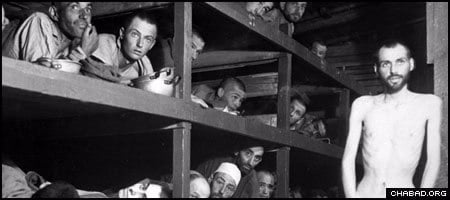Holocaust survivor and Nobel laureate Elie Wiesel arrived in Budapest today for an historic visit: his first official trip back to the country from which he and his family were deported more than 60 years ago. Following World War II and personally experiencing the horrors of Auschwitz, he once said that he would never return to his former home.
The visit, undertaken in honor of the 20th anniversary of Chabad-Lubavitch activities in Hungary, has understandably generated intense interest among many different sectors of society, from fellow Holocaust survivors and younger Jewish residents to members of the country’s ruling elite.
“I am very excited,” Eva Mucsi, a member of Budapest’s growing Jewish community, said the day before the visit, which will include a symposium sponsored by the Hungarian Parliament. “I hope that this will be a new step in [communal] relationships between Jews and non-Jews here.”
When Rabbi Shlomo Koves, director of the Open University for Judaic Studies in Budapest and associate rabbi of Lubavitch of Hungary, contacted Wiesel last summer about participating in the anniversary celebration, he knew that the author and human rights activist had previously turned down an invitation to join official ceremonies commemorating the 60th anniversary of the deportation of the country’s Jews. That invitation, extended by the Hungarian government, was issued in 2004.
The rabbi, however, hoped that given Wiesel’s correspondence with the Rebbe, Rabbi Menachem M. Schneerson, of righteous memory – the two met for the first time in 1962 – and his support of Chabad programs worldwide, that he would reconsider his prior stance.
In the end, Wiesel’s “closeness to the Rebbe and his respect for what Chabad does made the difference,” explained Koves. “He’s very excited and touched” by the offer.
Koves, who also serves as executive rabbi of the Unified Hungarian Israelite Community, contacted Prime Minister Gordon Bajnai to inform him that Wiesel would be in the country for three days this month. The two agreed that a parliamentary symposium would be a proper venue for Wiesel to address all segments of the public.
Wiesel will deliver the keynote address at the Dec. 9 symposium, entitled “Jewish-Hungarian Solidarity for a Shared Future.” The forum is sponsored by the Hungarian Parliament’s Committee on Human Rights, Minorities and Religious Affairs, the Unified Hungarian Israelite Community and the Federation of Hungarian Jewish Communities. More than 600 people, including all members of Hungary’s national government, noted academics, artists, local religious leaders and foreign representatives, are expected to attend.

Moving Forward
During the symposium, Rabbi Boruch and Batsheva Oberlander, who together established Lubavitch of Hungary in 1989, will receive the Future of Hungarian Jewry Medal in recognition of their efforts to rebuild the Jewish community following the collapse of Communism, said Koves. Bajnai will also deliver a speech in honor of the couple and their work.
Following the symposium, added Koves, Wiesel will attend a banquet in honor of the Chabad-Lubavitch Foundation of Hungary as the event’s guest of honor. Former Hungarian President Ferenc Mádl, Israeli Ambassador Aliza Bin-Noun, and German Ambassador Dorothee Janetzke-Wenzel have all signaled their intention to attend.
“This is one of the most important events for Hungarian Jewry in the last 20 years,” asserted Budapest native Daniel Bodnar. “The Holocaust still casts its shadow here, and it has to, because we have to remember it. But Wiesel, who survived the Holocaust, is coming here to talk about going forward.
“He is also coming to remember,” added Bodnar, “but [primarily], to go forward. People are very emotional about this visit.”
Wiesel’s schedule calls for a lunch with local Holocaust survivors and a tour of the Holocaust Memorial Center in Budapest on Thursday. He is also slated to appear on a popular primetime talk show.
“There are three parties, so to speak, for whom this visit is important,” said Koves, who was born and raised in Hungary, “the government, the Jewish Community, and the broader Hungarian society. All will have a chance to hear Elie Wiesel and his message.”
The rabbi added that as the country approaches next spring’s parliamentary elections, several sectors are viewing the visit as portending a renewed focus on reconciliation and dialogue between Hungary’s various ethnic communities.
Mucsi, though, spoke in more personal terms about Wiesel’s trip and the Chabad House’s 20th anniversary.
“I was one of the first people to go the Oberlanders. I knew nothing then,” she said. “Today, my daughter has a Jewish husband and six children. At the age of 20, my son finally had the ritual circumcision we could not have for him when he was a baby, because of the Communists. This celebration means a great deal to me personally.”








Start a Discussion